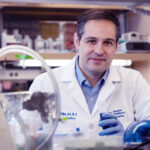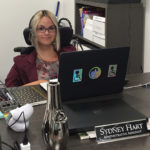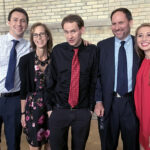Lucas receives gene therapy for DMD and finds his super muscles
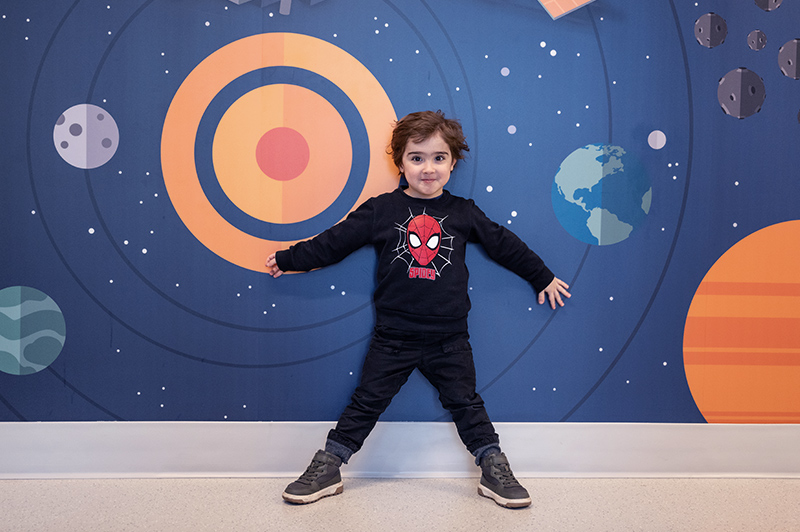
Lucas Toro has a lot in common with Gekko, the cartoon character from PJ Masks. They’re both “little guys” whose strength surprises people. And they both use their muscles for good.
Getting strong is a new feeling for Lucas — one he’s using to blaze new trails for other kids. In September 2023, he became the first child in Massachusetts to receive a newly approved gene therapy outside of a clinical trial for the most severe form of muscular dystrophy. In years to come, his progress will help doctors and researchers understand how the new therapy works so they can continue to advance treatments that prevent the disabling effects of the disease.
Concerning symptoms
Lucas’ parents Manuela and Luis spent much of their son’s early childhood concerned about his development. “We’d worry,” says Manuela, “but then he’d reach a milestone just in time.” Lucas never learned to crawl, for instance, but he started walking at 18 months — late but not “too late” for a child’s first steps. Yet even though he fell often and struggled to get up from the floor without help, doctors told them not to worry.
Things started to change in 2021 after Manuela, a pediatric psychologist, accepted a position at Boston Children’s Hospital and the family moved from Uruguay to Massachusetts. The following year, the director of Lucas’ preschool confirmed his parents’ concerns and recommended they follow up with his doctor.
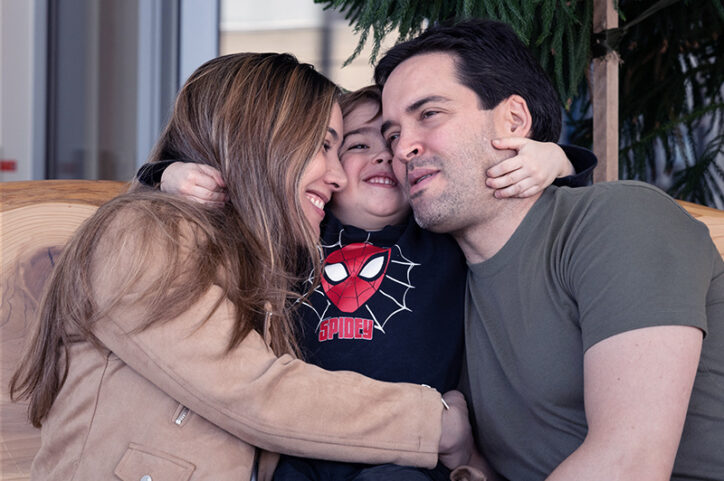
Alarming diagnosis
On their pediatrician’s advice, Manuela and Luis brought Lucas to Boston Children’s for physical therapy and scheduled an appointment with Dr. Partha Ghosh of the Neuromuscular Center. Despite her training in psychology, Manuela blotted out thoughts of why a neurological assessment might be necessary. “Even being in the field, my mind was in denial.” But then Dr. Ghosh sat down to break the news that Lucas had Duchenne muscular dystrophy (DMD).
DMD is a genetic disorder that causes progressive muscle weakness. It starts in the legs before moving into the upper body, lungs, and heart. The diagnosis meant that Lucas would likely be in a wheelchair by the time he was 12 and become increasingly disabled. Few people with DMD live past 30.
“It was hard news to hear,” Manuela says. “But it was also a blessing to receive the news here, at Boston Children’s, where we were in the best possible hands.”
A new approach to DMD: Gene therapy
Dr. Ghosh prescribed steroid therapy right away to slow the rate of muscle loss. He also told the Toro-Villa family about Elevidys, the first-ever gene therapy for DMD. He and his team had helped conduct clinical trials for the new therapy and the FDA was considering it for approval. Based on his genetic test results, Lucas could qualify.
Compared to other options that focus on addressing symptoms of the disease, Elevidys addresses its underlying genetic cause: the body’s inability to produce a protein called dystrophin. Without dystrophin, muscles break down and eventually get replaced by fatty tissue. This new therapy introduces a shortened version of the dystrophin gene (microdystrophin) that enables the body to produce a protein similar to dystrophin. In clinical trials, it has been shown to slow DMD progression.
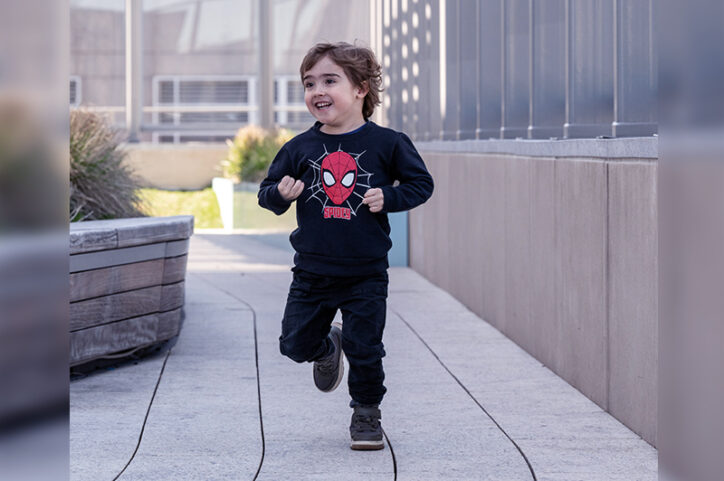
In June 2023, the FDA approved Elevidys for children between 4 and 5 years old. Lucas would turn 5 within a few months. The brand-new therapy offered both hope and uncertainty. If his parents said yes, Lucas would be the first child in Massachusetts to receive Elevidys outside of a clinical trial.
Luis asked Dr. Ghosh if it were his child, would he try the new therapy. “He told us, ‘This is the best option we have today. So, yes, I would do it,’” recalls Manuela. With this assurance, they made the choice to go ahead.
Big day: Lucas receives gene therapy for DMD
Lucas received Elevidys in one infusion in September 2023. Manuela, who in her clinical role helps parents cope with their children’s illnesses, experienced a flood of emotions: relief, hope, and tremendous anxiety. “We’re grateful to have this option so early in our journey,” she says. “But there are so many unknowns.” For instance, would Elevidys slow the progression of DMD? Would Lucas have side effects such as heart, lung, or liver damage?
Once the infusion was complete, it was time to wait and watch. The family returned to Boston Children’s weekly for blood draws, which, time after time, showed no signs of side effects. As Luis and Manuela sighed in relief, they saw a new Lucas emerge.
Lucas the superhero
“Within two to three weeks, we started seeing miracles,” says Manuela. On the playground, Lucas was running without falling, jumping, and climbing on structures. As his physical abilities expanded, so did his confidence. He started exclaiming, “Super Gekko Muscles!” as he jumped or climbed, a declaration he’d never made before.
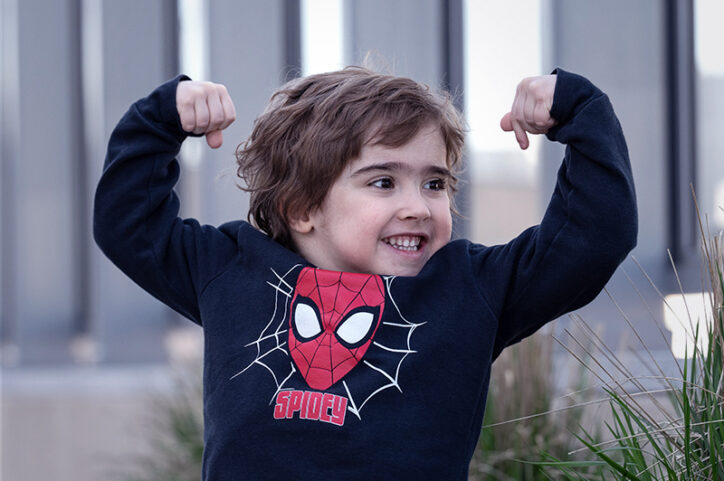
Watching these positive transformations, Manuela and Luis are careful to balance joy and hope with the uncertainty of their situation. They recognize that increased mobility so soon after the infusion could stem from the high-dose steroids Lucas received as part of the therapy. Only the coming years will tell how long that new strength will remain.
“It’s hard to know what the future holds,” says Manuela. “Our best hope is to delay the disease and capitalize on what interventions like physical therapy can do for him for as long as possible.”
For now, they’re taking things one step at a time and learning from their son who wakes up each day with a smile. “He’s teaching us so much about resilience.”
Learn more about the Neuromuscular Center and Gene Therapy Program.
Related Posts :
-

It takes a village and the world: Tariq’s care for Tourette syndrome
When your child is sick but you can’t figure out the cause or how to fix it, it can ...
-

The journey to a treatment for hereditary spastic paraplegia
In 2016, Darius Ebrahimi-Fakhari, MD, PhD, a neurology fellow at Boston Children’s Hospital, met two little girls with spasticity and ...
-

Minimally invasive approaches help ease Sydney's chronic pain
Sydney Hart wants to reimagine the traditional “handicap” symbol. In her online shop, she offers pins, stickers, and other products ...
-

Conquering a rare metabolic condition: A family, a pediatrician, and two labs join forces
As a newborn, Sam Hoffman never cried or made a sound. His mother, Carolyn, often had to wake him up ...



